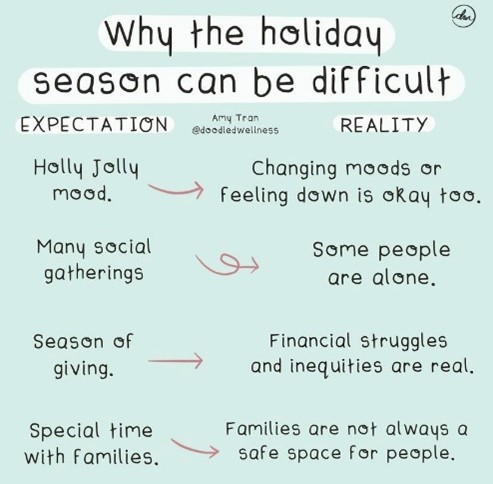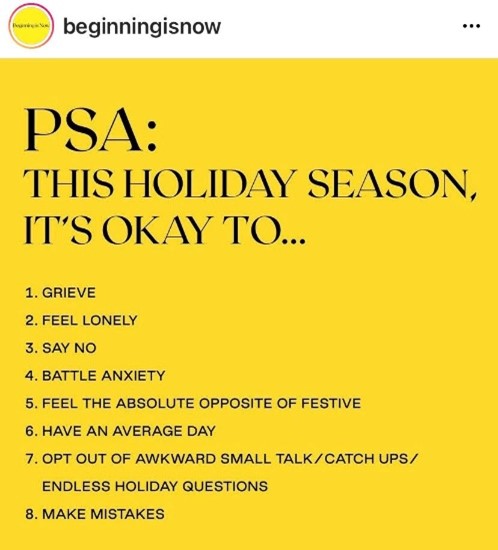Jenny Chabot, PhD, CCLS
Associate Professor, Ohio University
Child and Family Studies
The child life community is amazing at helping children and families when they are faced with healthcare stressors, life threatening illness, navigating trauma related events, and providing emotional support during times when children and families are at their most vulnerable. But we are not immune to our own personal pain, depression, family and life stressors, and anxiety. As we enter the December holidays and prepare for the New Year’s celebrations, we are bombarded by images of perfect holiday gatherings that can be triggering to those who struggle, making this time of year personally difficult. I know a few of my friends and some colleagues are flattened by depression and they have expressed it feels worse during this time of year.
First and foremost, if you know of anyone in your life that struggles during the holidays and as the New Year approaches, reach out to them. Make a phone call to check in. Send a handwritten note to let them know you’re thinking of them and acknowledge this can be a hard time of year.
For those struggling themselves facing the busy holiday season, Better Help (www.betterhelp.com) offers some tips that are useful during the holiday season. Shared from https://www.betterhelp.com/advice/depression/12-tips-for-dealing-with-holiday-depression, these include:
- Don't Be Afraid to Switch Up Tradition: The holidays are usually full of tradition. However, if you are feeling depressed, you may not want to go through the motions of the normal activities that you do. That's okay. Don't pressure yourself into trying to keep up with things that you did years ago when you were feeling much better. It's okay to relax on the traditions and let some things go until you feel better.
- Don't Set Unrealistic Expectations on Others: The holidays are usually spent with others, which can set us up for being let down. Let go of your expectations for the year. Allow things to just happen and don't put pressure on others to make everything "perfect".
- Let People Close to You Know What's Going On: There is no reason that you should hide your holiday depression from your family and friends. In fact, doing so could lead to your mental health getting worse. Instead, let them know what you are going through and how you are feeling. Make sure to let them know that you don't expect them to make it better. Talk to them about things that you are comfortable with at the moment and also that you may not do all of the things that you normally do during the holidays.
- Allow Other People to Help: If you are the person that is usually responsible for pulling the holiday together this can be a difficult thing to do. Allow yourself to delegate tasks to others and ask others to pitch in and help. If you've been running the holiday for years, people might not know how to help you with it. Make sure you find a way to divvy up the tasks. Or if your depression, has you to the point that doing that sounds too overwhelming, simply hand the reigns over to someone else for the year.
- Get Enough Rest: The pressure of the holiday can make it difficult to rest. There are a lot of activities that need to be completed and places to go. When you are starting to struggle, get out your calendar and start marking time off. Use this as "me time". You could use it to stay home and sleep, watch a holiday movie, read a book, or any other activity that you enjoy.
- Connect With Others: When feeling depressed, many people start to seclude themselves from others. They withdraw from family and friends, avoid going to social gatherings, and just stay home behind closed doors. This may feel like the most comforting thing to do at the moment, but it is not helpful for you and your holiday depression. The longer you stay by yourself, the more you’ll start feeling lonely and jeopardize your mental health even more.
To take better control over our depression over the holidays, Mayo Clinic offers additional tips to prevent triggers that deepen depression. Shared from https://www.mayoclinic.org/healthy-lifestyle/stress-management/in-depth/stress/art-20047544, these include:
- Acknowledge your feelings. If someone close to you has recently died or you can't be with loved ones for other reasons, realize that it's normal to feel sadness and grief. It's OK to take time to cry or express your feelings. You can't force yourself to be happy just because it's the holiday season.
- Reach out. If you feel lonely or isolated, seek out community, religious or other social events or communities. Many may have websites, online support groups, social media sites or virtual events. They can offer support and companionship.
- Be realistic. The holidays don't have to be perfect or just like last year. As families change and grow, traditions and rituals often change as well. Choose a few to hold on to, and be open to creating new ones.
- Set aside differences. Try to accept family members and friends as they are, even if they don't live up to all of your expectations. Set aside grievances until a more appropriate time for discussion. And be understanding if others get upset or distressed when something goes awry. Chances are they're feeling the effects of holiday stress and depression, too.
- Learn to say no. Saying yes when you should say no can leave you feeling resentful and overwhelmed. Friends and colleagues will understand if you can't participate in every project or activity. If it's not possible to say no when your boss asks you to work overtime, try to remove something else from your agenda to make up for the lost time.
- Seek professional help if you need it. Despite your best efforts, you may find yourself feeling persistently sad or anxious, plagued by physical complaints, unable to sleep, irritable and hopeless, and unable to face routine chores. If these feelings last for a while, talk to your doctor or a mental health professional.
The last tip on the above list makes me think of one of the best quotes from the beloved Charles Mackesy book, “The Boy, The Mole, The Fox, and The Horse,”: What is the bravest thing you’ve ever said?” asked the boy. “Help,” said the horse. (2020, p. ). This is a time where we need to acknowledge its OK to ask for help, even if we are the ones that provide it in our work lives, and in our personal lives.
In a recent conversation with CCLS Samantha Telgkamp, she shared some thoughts on depression and anxiety during the holiday season, from her lens as a newer child life professional who has struggled with depression and anxiety during her life. Samantha has been very open in sharing her history with depression and anxiety diagnosis, especially during her time as a child life student, in a June 2020 Blog (see PRC June 2020 Blog, Chabot J. Topic: Topic: Mental Health Concerns Among Today’s College Students). Here are a few of Samantha’s thoughts for those in the child life community facing depression during the holiday season and/or working with others who may be struggling:
Be aware of child life students and what they face during the January 5th deadline for the child life practicum and internship application process. This can already be a difficult time for candidates that struggle with their mental health and adding the holiday season can make it a particularly tough time, as they work to gather their application materials in a recognized competitive and often overwhelming process.
Watch out for your colleagues and selves that cover shifts during this time of year. Healthcare is a profession that does not close for the holidays, so it may be extra difficult on staff covering these times as they balance trying to meet the needs of their family and friends during the holiday.
Don't minimize any personal pain. Child life professionals always acknowledge what a gift it is to be a part of a patient and family’s holiday experience, and this does help put our own lives in perspective. However, this doesn’t minimize any personal pain a staff member may be going through.
Acknowledge staff who have lost a loved one and are grieving and recognize that the holidays can be a particularly difficult time, as grief can be amplified.
Child life professionals are not immune from feeling isolated during times of family separation, as is a reality of our current pandemic. Additionally, working in a healthcare setting can increase worries that you will carry an infection home to your family, and this can be a very real fear for healthcare staff.


References:
Haig, M. (2021) The Comfort Book. London, England. Penguine Life.
Shields, B. [@beginningisnow]. (2021, December 5). PSA: This Holiday Season, It’s Okay To… Instagram photo): Retrieved from:
Kirby, K. 12 Tips for Dealing with Holiday Depression. (2021, February). https://www.betterhelp.com/advice/depression/12-tips-for-dealing-with-holiday-depression
Macksey, C. (2019). The Boy, the Mole, the Fox, and the Horse. New York, New York. Harper One Publishing.
Stress, depression and the holidays: Tips for coping. https://www.mayoclinic.org/healthy-lifestyle/stress-management/in-depth/stress/art-20047544. (2020, December). Mayo Clinic Staff.
S. Telgkamp, personal communication, December 2, 2021.